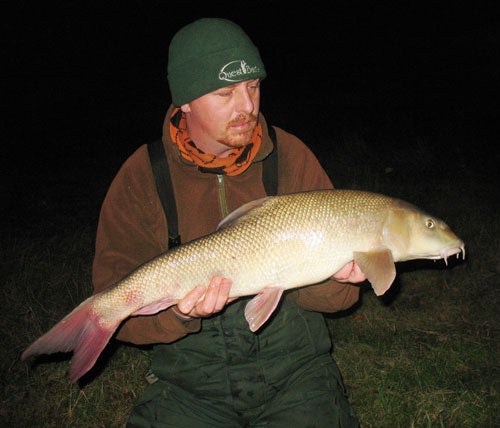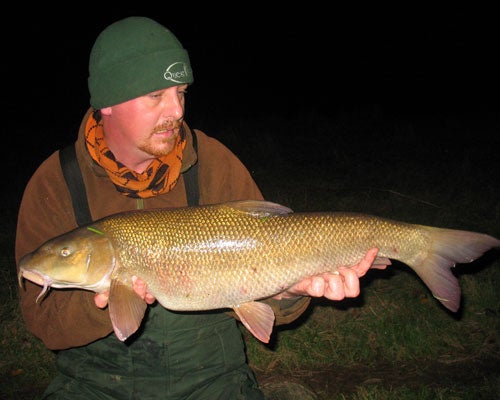| After having about half a dozen trips without being able to locate any barbel on a small local river, I made my second trip of the season to the Lower Severn (15/11/08).
From what I can gather the Lower Severn has fished really slowly this season, so with this in mind we had decided to wait for perfect conditions before we fished it again. I always feel more confident on this river when it is carrying plenty of extra coloured water. Anyway this was the case as the river was chocolate brown in colour with a rising water temperature of 8.2 deg. C. The level was perfect also, with it carrying about 9 feet of extra floodwater. You couldn’t really have hoped for better conditions to catch a November barbel and after fishing the Lower Severn every winter for about the last 12 years I knew from previous experience that these conditions could very often produce the bigger fish. My first choice of swim was not fishable with the river level being about 2 feet too high, to fish it properly, so I made my way to another swim which I knew would be fishable in these conditions. This particular swim is situated above a noted snag swim and I was confident that any barbel that normally took residence in the snags would be moving about away from the snags in the perfect river conditions. I started fishing at 12.30pm, fishing two rods, I fished one on the ever reliable trimmed down Quest Baits frozen Special Crab boilie wrapped in matching paste in conjunction with a modified feeder filled with 4mm pellet and carrying about 5 ounces of lead. Both the boilies and the paste were covered in a liquid crab flavour which I am currently trialling for Quest. The other rod was used as a ‘rover’ alternating with Liver (a new Quest product I am trialling) flavoured meat, crab flavoured meat balls and some new Surf ‘n’ Turf boilies which I am again trialling for Quest Baits. There was very little leaf debris coming down the river (this can make the fishing on the Lower Severn a right pain at times in the winter), which meant that after the initial couple of casts I could leave the feeder in for as long as an hour and fifteen minutes without any problems. I like to leave the feeder in for a good length of time (during winter) so as not to risk overfeeding any barbel that may be in the swim. After 3 biteless hours in perfect conditions I was beginning to think some of the stories of the ‘death of the Lower Severn’ might be true. I reeled in (sometimes just resting the swim can help) and went and had a chat with my mate, only to discover that he was fairing no better. I decided to stick it out where I was as nowhere else really took me has being any better. Anyway at about 4.30pm the feeder rod showed a very tentative ‘rod knocking’ type of bite which I struck at to be met with the firm resistance which was obviously a barbel. This turned out to be an old looking fish of 11lb 2oz.
The feeder rod had been in for about an hour when the baitrunner started to scream (I was tying a new hook length onto the rover rod) and once again the strike was met with a firm resistance which was obviously a barbel. A slow ponderous fight was over after 7 or 8 minutes and a lovely conditioned fish was soon in the net. This fish was totally different from the first one being an almost immaculate, bronze thickset fish of 13lb 6oz which had obviously been having a good feed during the floodwater conditions.
I fished on till 8.30pm with no other bites, but after such a nice brace I wasn’t really bothered, and once again fishing in flood conditions had ‘come up trumps’. Lower Severn rumours and conjecture! There are a number of rumours going around at the moment concerning the fact that the Lower Severn has not fished well for the last couple of winters, and the recent big summer floods are being blamed for this. One of the rumours is that the fish have been washed out to sea and lost. I can’t believe this for one minute as the barbel is the perfect fish to survive the flood conditions (they only need a stone to hide behind). You only have to see a barbel jump clean out of the water in the middle of the river during a raging flood to see what they are capable of living in. Also if loads of barbel have been flushed out to sea then how come loads of smaller barbel haven’t been flushed downstream from the middle Severn which after all absolutely flies through when in flood. I can understand this theory for there being lots of bream lost but not barbel. Another of the theories is that the big summer floods have deposited loads of silt and natural food that have made the fish harder to catch. This one is more believable as the fish being caught are certainly ‘as fat as butter’, so are obviously feeding on something. I can remember a couple of years ago when the matchmen on the Warwickshire Avon were struggling to catch any roach. The common acceptance was that the roach had been eaten by cormorants and zander etc. Then on one of the Avon festivals the anglers were allowed to use bloodworm, there were loads of roach caught, so they were obviously pre-occupied on naturals and the zander / cormorants were just another one of our angling excuses for not being able to catch them. The session I have described in this piece was on a Saturday and as I say was in perfect conditions, yet I only saw one other angler and it was obvious looking at the banks that hardly anybody had been there. If anglers are not going to fish in perfect conditions (through listening to others saying how poor the fishing is) then they aren’t going to catch many fish and hence the river soon gets a reputation of having no fish in it. I also think that the lack of bait going in because of the angler staying away can have an adverse affect on the fishing. I have fished the Lower Severn for about the last dozen winters (usually starting about October) and most seasons the fishing is different to the last (I wrote a piece for this website called ‘wandering about barbel’ [see link below] about this very fact). I have known seasons where there have been lots of small barbel on one stretch and then next to none the next season (but what fish were there were of a much bigger average.) The barbel are a truly wild fish that can move anywhere they want (there have been a lot more bigger fish caught further upstream the last couple of years, so it just shows how they can migrate), so just because we as anglers are not catching them doesn’t mean they are all dead. It will probably be totally different again over the next couple of seasons. |
Welcome!Log into your account















